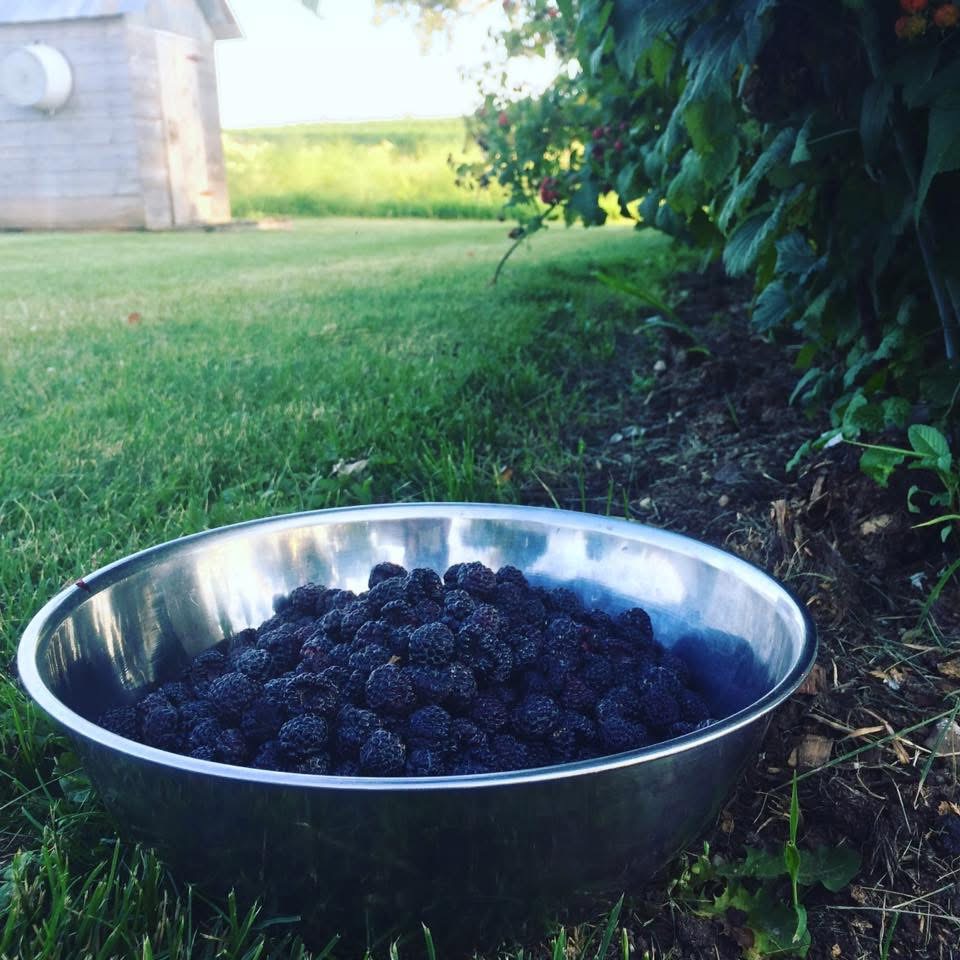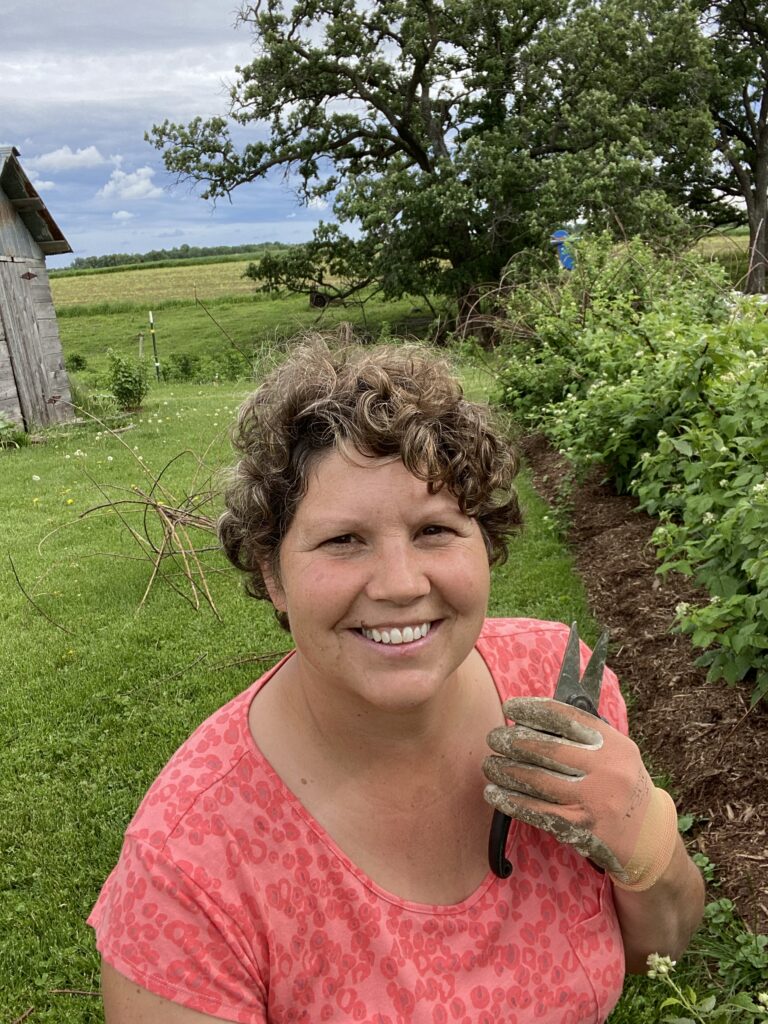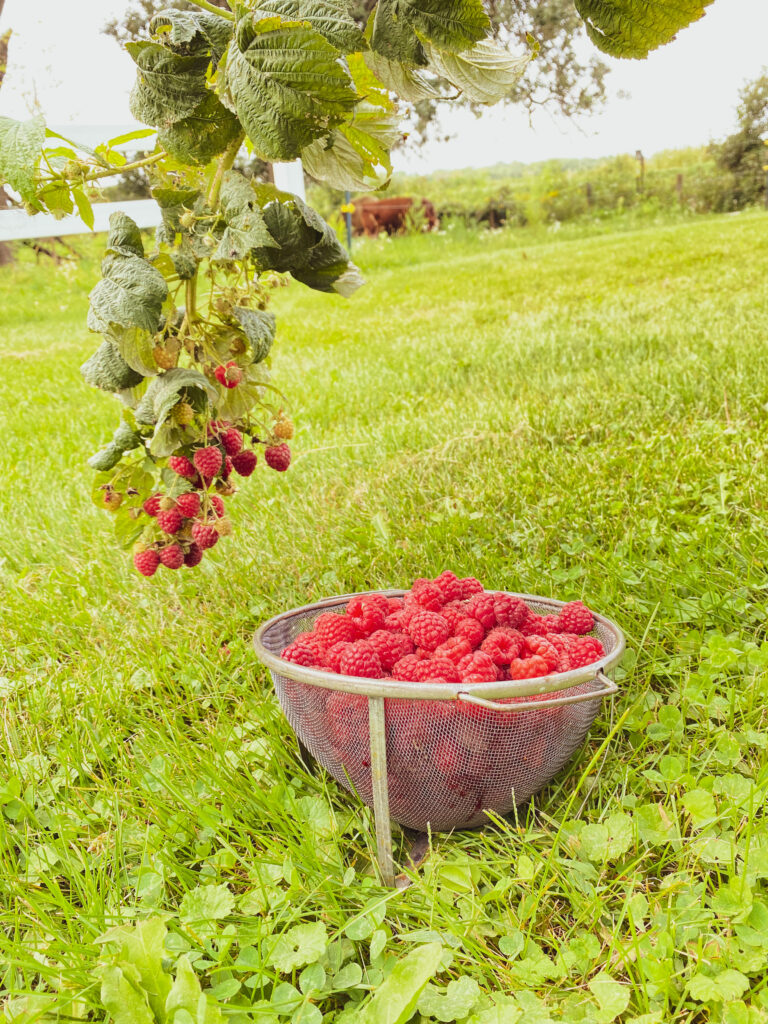
First off allow me to define the difference between black raspberries and black berries.
Last week we dug the black raspberries out of the end of the garden and I sprinkled some sunflower and zinnia seeds into the empty space. The raspberries had been planted there approximately 10 years ago, transplanted from the original berry patch that we tended during the years we took fruits and veggies to Farmers Market. Black Jewel was the variety. This variety promised to have large juicy fruit that would be pleasing to market customers. And since at the time we were looking to make a profit from the homestead, it seemed to be a good fit for us.
After transplanting the berries to the garden, I faithfully tended them. Pruning them right after harvest, allowing new growth that would be the next season’s fruit bearing canes. Removing weeds and piling on compost each year. And yet each year the amount of fruit we got didn’t seem to be worth all the effort we had put in. And each year we had more winter kill and even less fruit leading us to that fateful day when the gardener, me, finally said. “ I am done babying you, you’re leaving the garden!”
Following are some of the things that went wrong:
We chose a hybrid variety. A variety that was bred to produce large, juicy, pleasing to the eye, fruit. These varieties are often bred for commercial growers, knowing that ‘for profit’ growers are willing to use fungicide and insecticides to ensure that they get a good harvest and therefor a good profit. After doing a bit of research and visiting with my brothers who both grow produce ‘for profit’, I learned that the Black Jewel variety is know to be susceptible to the cane borer. This insect borrows its way inside of the cane and weakens the cane, making it susceptible to blight and often causing a low yielding harvest. Since I had first hand watched the fruit bearing canes wilt and drop their unripe fruit year after year, I knew this was the problem with my berries. The solution my brothers offered was this, spray with an insecticide multiple times a season to interrupt the life cycle of the cane borer and give my canes a chance to become healthier, followed by a fungicide to help get rid of blight and my plants should be back to producing the fruit I expected. Not willing to use these products on fruit that was supposed to provide my family with nutrition, I decided to try for a few more years. My plan was to figure out our soil PH level and learn what fertilizer I needed to use to help my plants grow vigorous and strong. Because a thriving plant is a gardener’s first line of defense against disease and pests. 3 years of even more careful tending with no improvement brought me to the decision to remove them from the garden.
What we will do differently if we decide to try again with black raspberries.
We will buy a variety that is bred for disease and pest resistant. Preferably an heirloom variety that has been around for 100s of years. I would be even happier if we could find someone in our growing region that has an established black raspberry patch and is willing to share with me. My favorite is when the owner of the property says something like this, “I don’t know much about these black raspberries, they were here when I moved here 50 years ago” or “My grandma planted these berries and our family has consumed hundreds of pounds over the last few decades.” These are the plants I want! An heirloom variety, established and having built up resistance to the pests and diseases in our area. And best of all, built up a tolerance for our cold winters.
One of the varieties that I have found so far (thanks to a kind YouTube Commenter) is the ‘Ohio’s Treasure’ variety. I’ll do a little more research and allow more time to pass before I jump in to try this variety. Hopefully in the meantime finding someone local who is willing to share from their established berry patch.
Another thing that is stacked against my attempts to grow black raspberries is our harsh winters and short growing season.
Pruning the black raspberries happens right after harvest. In our region, berries are produced in July and pruning happens in August. When a cane is pruned it sends out 3-4 new canes from the pruning sight. These new canes are next season’s fruit bearing canes. As these canes begin to grow they are tender and green with no thorns, as they mature they become ‘woody’ and winter hardy! Because our average first frost date is September 15. This means that these new canes have 6-8 weeks to grow and become winter hardy. Any part of the new canes that was not yet woody will die and not produce any fruit the following season. Combine a short growing season, a harsh winter and a plant that is weakened by pests and disease and its no wonder that my black raspberry plants struggled to produce a crop.

Pruning the black raspberries in 2022
During the last 10 years I have also studied the wild black raspberries that grow in the woods. Watching them thrive while mine slowly diminished. Harvesting more from the wild berries than we did from my carefully tended patch in the garden proved to me that my system was not working. Granted I had to be vigilant to get to the wild berries in the woods before the birds did! The biggest difference I could see was that the wild berries were not pruned. They just grew longer canes, each season producing berries on the new growth of each single cane. When those canes grew long enough to reached the ground, they rooted and a new plant began to grow. Obviously I couldn’t try and mimic this in my garden and leave the black raspberry plants unpruned because they would take over the garden in a few short growing seasons.
The other thing I noticed is that the wild berries thrived on the edge of the woodland, even on the north edges, receiving sunlight for only part of the day, often over grown with weeds and grasses. This lead me to ask the question, ‘Maybe black raspberries prefer partial shade and cool damp roots?”
What will I do with this knowledge I gained from studying the wild black raspberries?
When/if I plant black raspberries again I will plant them at the edge of the woods. I won’t try to keep the weeds down and I’ll do my best to mimic the natural habits of the wild black raspberries in the area!
In fact as I write this I feel inspired to go find all the roots we dug out of the garden, plant them at the edge of the woods to see if they can recover and grow strong if given a habitat similar to the one of their wild ancestors.
And perhaps, what I thought was me giving up on growing black raspberries was simply the pivot of me turning away from the influence of commercial, for profit, growers and going back to the more traditional way of growing raspberries for my family’s nutrition. Yes perhaps the berries I grow will not be as pleasing to the eye as those one could purchase at the grocery store, but that’s all mindset. We have been conditioned to choose food based on its visual appeal and one of the first steps towards food independence is choosing our foods based on the nutrition they offer.
To me that looks like fruits and veggies grown on strong thriving plants that are planted in healthy soil.

Also, Here’s a shoutout to the red raspberries on the other side of my garden who have been like an angel child. Producing large juicy fruit on non thorny, upright canes from July through first frost. You who came from an old farm in the local area with no variety name or specification. You fill our tummies AND our freezer each year. You are the real star of this story!
For those of you who prefer to learn by video format here is the link to the video we published about removing our black raspberries from the garden. Lots of great conversations happening in the comments of this video too! Watch Here
As an Amazon Associate I earn from qualifying purchases.
COPYRIGHT © 2025 RUTHANN ZIMMERMAN
Made with ♡ by Porter Homestead Designs
One Response
Hi- I enjoyed your video on the raspberries. I enjoy all your videos! I’m battling a jungle of blackberries, cutting them back day by day. I am so happy for you and your family life in Iowa:) I was born in Burlington, Iowa. Take Care, Roberta